We don’t just install plugins. We map your business logic, audit your sales flow, and fully connect your CRM to WooCommerce, including customers, orders, tags, emails, and more.
Need a HubSpot WooCommerce integration for automated marketing?
Want to link your B2B sales with a Salesforce + WooCommerce plugin?
Planning full data sync between store and CRM?
Let WPWP.BZ handle the tech, so you can focus on scaling.
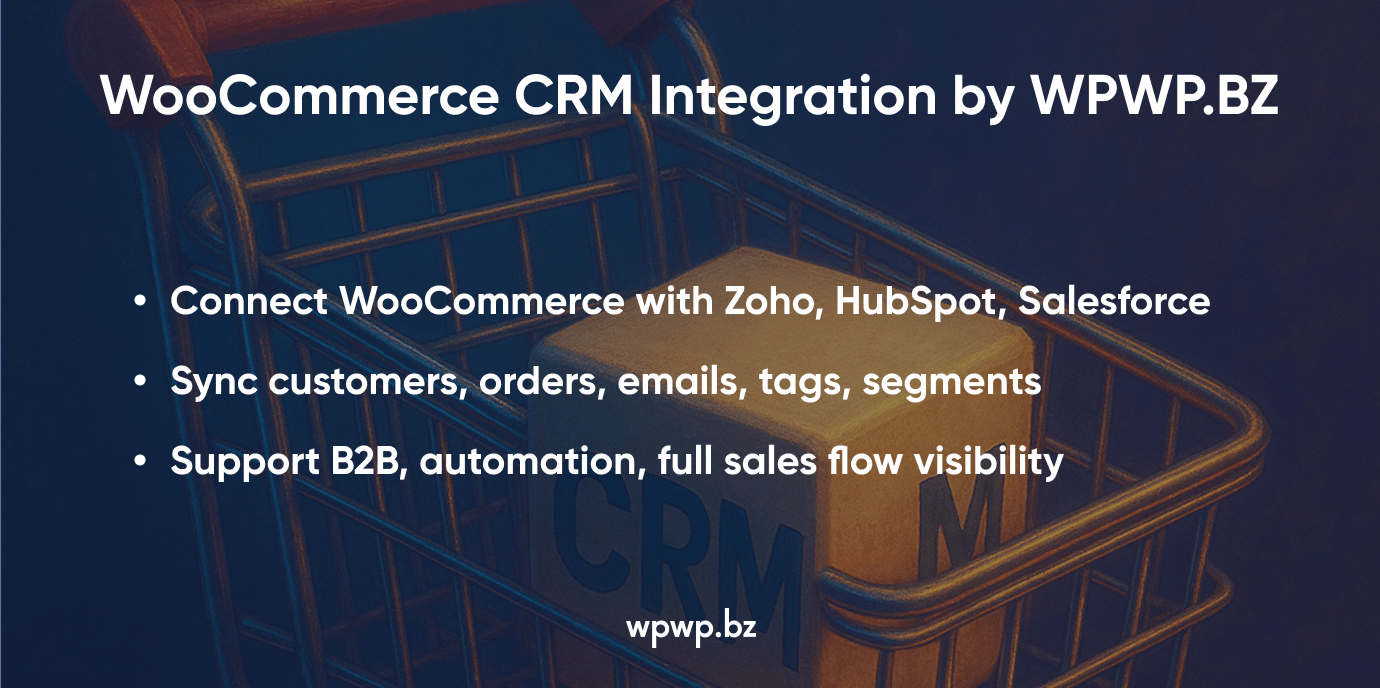
Why Your WooCommerce Store Needs CRM Integration
If you’re managing a WooCommerce store and still handling customer data manually, you’re probably spending more time than you should and missing out on insights that could grow your business.
The real issue isn’t just about time. It’s about structure. Without a proper WooCommerce and CRM connection, things start to get messy fast: contacts in one place, order history in another, email campaigns launched from yet another tool. It’s a patchwork. And patchworks break.
Now, some store owners try to make it work, copying customer info from WooCommerce into their CRM by hand, managing tags in spreadsheets, trying to keep up. But over time, that kind of manual CRM entry vs automated sync becomes risky. One missed update, and you’re sending the wrong offer to the wrong person… or not sending anything at all.
With CRM integration, everything’s in sync. Orders, customers, emails — all in one system. You stop guessing who your buyers are and start actually knowing. That’s when real eCommerce customer management kicks in.
It’s not just about sales, either. When your CRM and WooCommerce talk to each other, marketing gets easier. Support gets context. Analytics start to make sense.
And that makes all the difference.
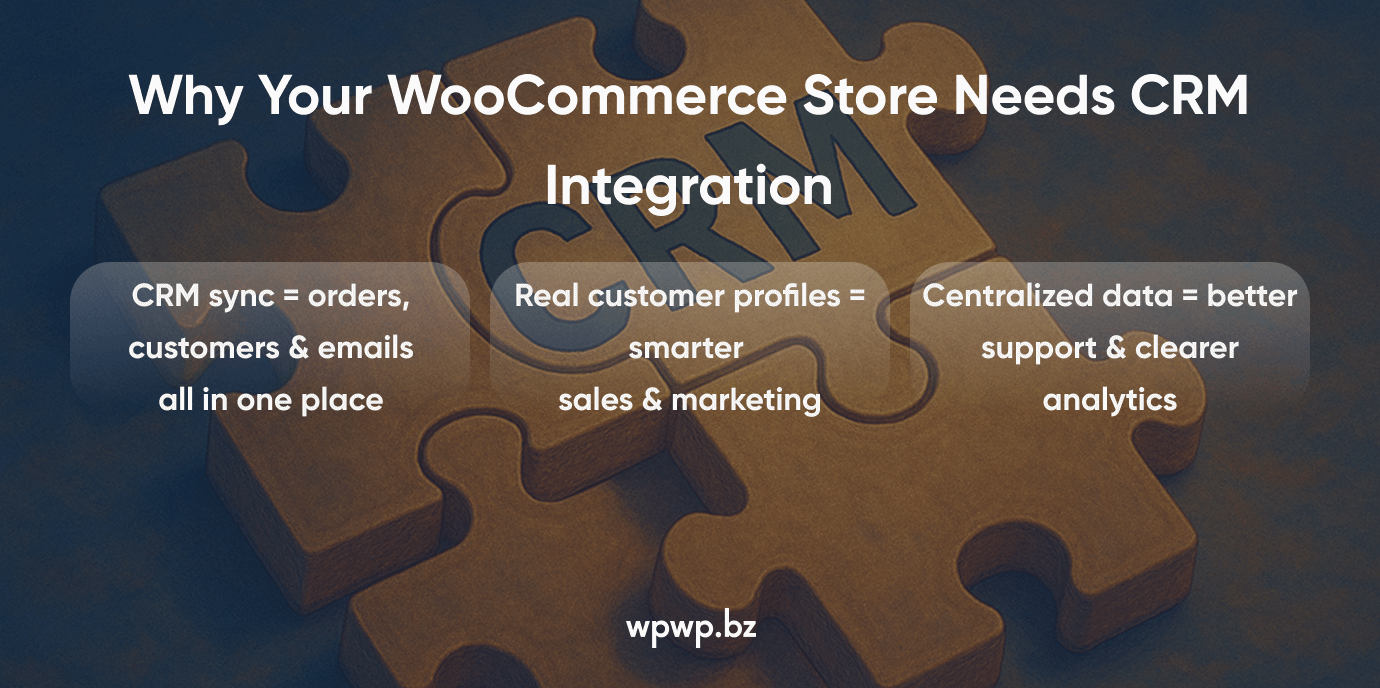
Top CRM Systems for WooCommerce
There’s no single best CRM for WooCommerce. We’ve learned that the right one really depends on how your store operates, who your customers are, and what you’re trying to automate.
Zoho CRM
Let’s say you’re running a smaller shop, maybe a niche product line, and you’re just starting to grow — Zoho CRM might be the right fit. It covers the basics well, without being too complicated or expensive. There’s a plugin that links Zoho to WooCommerce, and it usually does the job for syncing orders and managing contacts.
HubSpot
If you’re more focused on email campaigns, customer journeys, and behavior-based marketing, HubSpot is a strong choice. We’ve seen WooCommerce stores plug it in and immediately gain visibility into what customers are doing — what they click, abandon, purchase. The sync pulls in that data and lets you run fairly sophisticated flows. It’s not the simplest setup, but once it’s live, it works smoothly.
Salesforce
With Salesforce, it’s a different kind of tool. More enterprise-level. If you’re selling B2B or need detailed reporting and workflows, this one has serious horsepower. It won’t connect straight out of the box, but the flexibility is worth it when your sales process has more moving parts.
Dynamics 365
Then there’s Dynamics 365. This one tends to be a good fit if your team is already inside Microsoft’s world and you want your store to be part of that same flow. When WooCommerce and Dynamics talk to each other, a lot of things like inventory, billing, and support get easier to manage.
So, the “best CRM” depends on what matters more to you — speed, flexibility, integrations, or marketing. We help clients figure that out before touching any tech.
Sometimes the simplest answer is the right one. Sometimes it’s the most scalable.
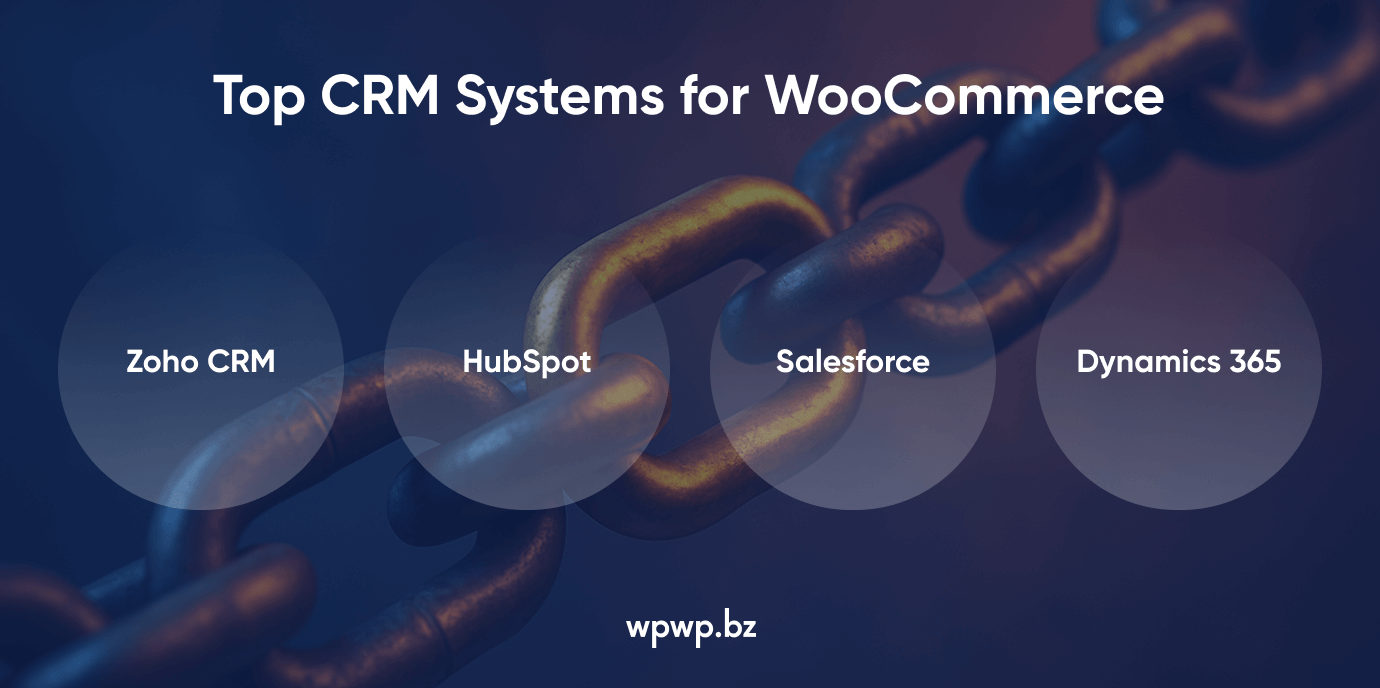
How WPWP.BZ Implements CRM Integration for WooCommerce
There’s no one right way to connect WooCommerce to a CRM and frankly, that’s the point. Every store is different, and what works for a small cosmetics brand isn’t going to cut it for a B2B supplier managing multi-step quotes.
So before touching any tools, we start with a proper audit. What CRM are you using (or thinking about using)? How is your WooCommerce store set up? Do you already have customer data? Where is it? How clean is it? That first step is critical, because jumping into integration too early usually leads to a mess.
Once we understand your current setup, we decide together which approach makes the most sense.
In some cases, it’s simple: a plugin is all you need. Say you want to connect WooCommerce to Zoho CRM — we might use CRM Perks or a native Zoho module to handle that. They usually cover the essentials: contact sync, order logging, maybe some basic tagging. Fast and fairly painless.
Other times, plugins fall short. Maybe you need to pull in extra fields, or trigger an email when a customer buys a certain product. That’s when we look at automation tools like Zapier or Make. If your goal is something like WooCommerce to HubSpot using Zapier, we can create multi-step logic: “New order → Create contact → Add to email list → Notify sales team.” All without writing code.
Then there are cases where nothing prebuilt will cut it and we go the custom route. With CRM API integration for WooCommerce, we connect your store directly to the CRM backend, mapping every data point exactly where it needs to go. This is what we do for complex Salesforce setups, or when Dynamics needs to talk to inventory and finance systems behind the scenes.
Regardless of the method, the process stays roughly the same:
- Audit your current WooCommerce and CRM systems
- Select the integration type — plugin, Zapier, or custom API
- Set up the sync logic — field mapping, triggers, order statuses, customer updates
- Test thoroughly — simulate different order types, edge cases, and customer flows
- Go live — with monitoring, support, and documentation, so nothing gets lost
We don’t leave you with an “almost working” connection. This is a done-for-you CRM setup for WooCommerce, built to keep running even after plugins update or your marketing team changes things.
And if something breaks, we’re here. Not as a plugin vendor, but as your team.
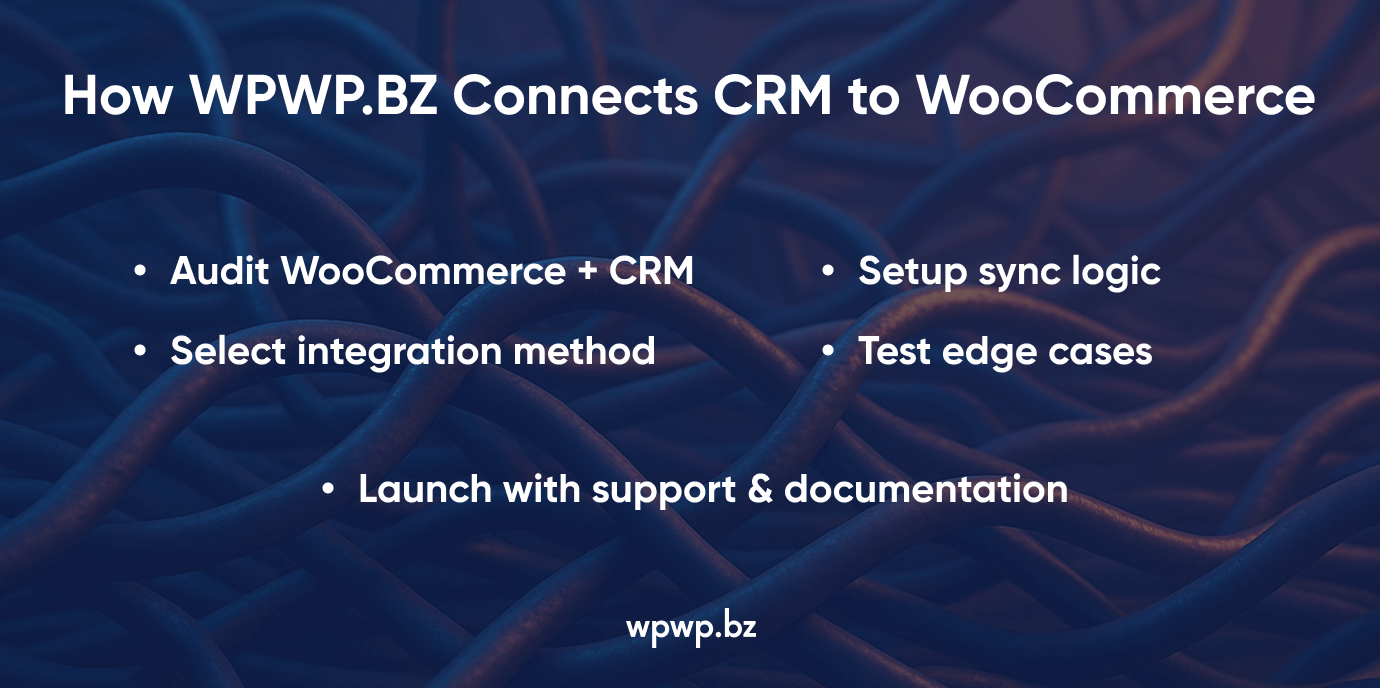
Benefits for Sales, Support & Marketing
Once your CRM is properly connected to WooCommerce, things start to feel… organized. You’re no longer guessing who your customers are or scrambling to follow up manually. The data’s there. It flows in automatically, and it’s all in one place.
Your team gets centralized customer profiles — real ones, not scattered records. Each buyer’s order history, status, tags, email activity, even support conversations, all synced and visible. That alone changes how you sell.
From there, it’s about automation.
Abandoned cart? Send a follow-up. First-time buyer? Fire off a welcome sequence. Customer hits a purchase threshold? Time for a VIP thank-you.
This is where CRM email automation for WooCommerce really shines. You’re not blasting everyone with the same newsletter anymore. You’re building trigger-based campaigns that respond to what people actually do in your store.
Behind the scenes, it’s order sync between WooCommerce and CRM that makes this all work. New purchases update contact records. Status changes fire tasks. Product interest can move someone to a new segment. It’s subtle, but powerful.
Speaking of segments — yes, WooCommerce lead segmentation becomes far more dynamic. You can group buyers by category, frequency, location, spend level — whatever makes sense for your marketing. No more CSV exports. No more guesswork.
And all of this feeds into reporting that’s actually useful. Instead of just seeing sales totals, you start spotting patterns, where leads drop off, which campaigns drive action, what makes people come back.
Support gets smarter, too. When someone reaches out, your team sees what they ordered, how long they’ve been a customer, and if they’ve had issues before. That context? It saves time and builds trust.
Bottom line: CRM integration doesn’t just clean up your back office. It gives your team a system they can rely on and your customers an experience that feels connected.
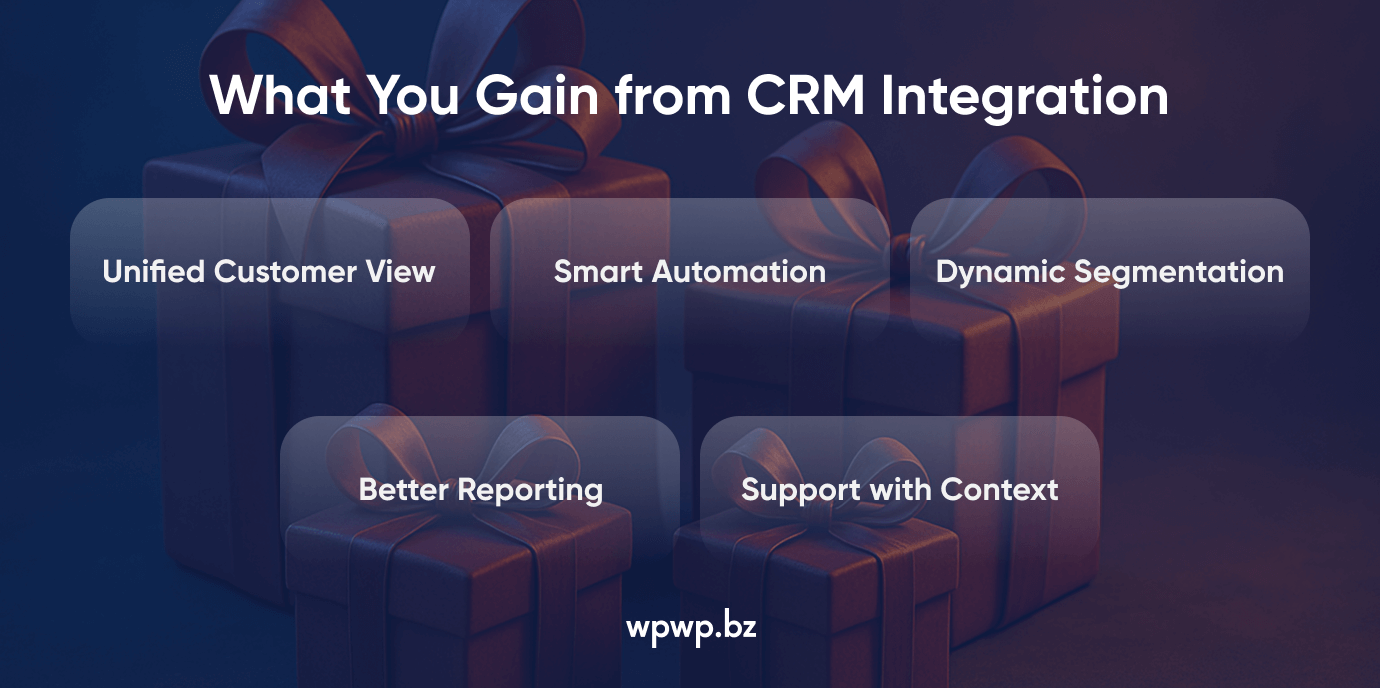
Compare Integration Methods: Plugin vs Zapier vs API
When it comes to connecting your CRM to WooCommerce, there isn’t a single “best” way — just the one that fits your setup, budget, and how hands-on you want to be.
Let’s start with the obvious one: plugins. For many store owners, this is where it begins and sometimes ends. You install a plugin (like CRM Perks or one from your CRM provider), follow the setup wizard, and that’s it. It usually covers the basics like syncing orders and contacts. And if your business runs on straightforward flows, this might actually be enough.
But here’s the catch: plugins don’t always play nice when things get more complicated. Want to sync custom fields? Trigger actions based on product types? Segment users into multiple lists? That’s when you start pushing against the limits and that’s also when people start looking at Zapier.
Zapier is kind of the middle ground. It’s a no-code automation tool that sits between WooCommerce and your CRM. You can set up logic like “new order → new contact → add to campaign” in just a few clicks. It’s flexible, and you don’t need a developer. That said, once your processes grow, Zapier can become hard to manage. Lots of little rules. And the cost can creep up if your volume increases.
Now, if you’re serious about control and especially if you’re using something like Salesforce or Dynamics — a custom CRM API integration for WooCommerce is worth considering. It takes more time, yes, but it gives you complete control. You define what gets synced, when, and how. No limitations, no workarounds. Just the data doing what you need it to do.
So, plugin, Zapier, or API?
Each one works. It just depends on how far you want to go, and what “working” really means for your team.
Ready to Connect CRM to WooCommerce? Let WPWP.BZ Handle It for You
By now, you’ve seen what proper CRM integration can do — cleaner customer data, automated marketing, better reporting, and way less time spent copying info from one system to another. Whether you’re just starting out or running a high-volume store, having your CRM and WooCommerce fully connected can change how your business runs day to day.
At WPWP.BZ, this is something we do all the time. We’ve helped stores connect with Zoho, HubSpot, Salesforce, and Dynamics using plugins, Zapier, and custom API work. We’re a CRM WooCommerce setup agency that looks at the full picture: how your store works, what your team needs, and how to keep things running smoothly long after launch.
So if you’re looking to get WooCommerce CRM integration service done right, without guesswork, delays, or duct-tape fixes, we’re here to help.
Book a free audit. Ask questions. Hire experts to integrate CRM with WooCommerce and finally make your store and CRM work as one system.












